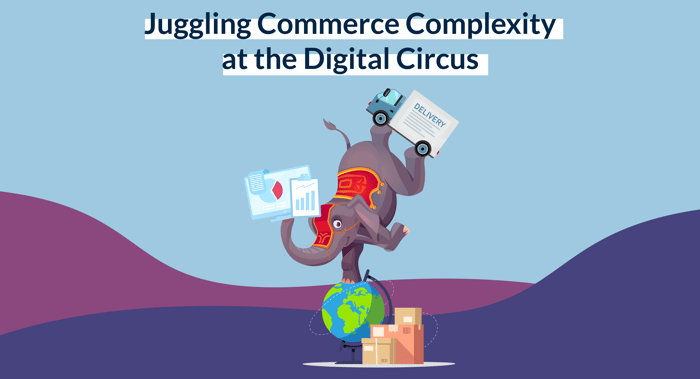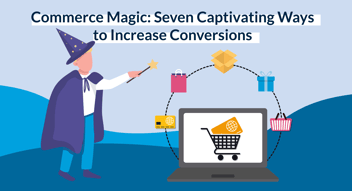CEO CORNER: Juggling Commerce Complexity at the Digital Circus

It’s undeniable that commerce is becoming more complex and that data insights are now more critical than ever for informed decision-making. Unfortunately, this complexity has brought about an overwhelming range of software, platforms, and plugins for brands to juggle. Modern commerce feels somewhat akin to a digital circus.
Juggling different systems while walking the tightrope of profitability is great when it works, but you might not be able to keep up the act for much longer. Commerce is changing and your operations are about to get a whole lot more complicated. Retail executives expect “major increases in operational requirements” around fulfillment and digital-related functions during 2023, and it’s no surprise that less than 50% feel prepared to manage digital complexity.
Going forward, if merchants are to prosper, they need to consolidate their software and streamline operations.
The Elephant in the Room
Let’s face it — many brands aren’t doing themselves any favors by trying to juggle too many balls.
Yes, you need CRM, ERP, POS, payment processing, data collection, and even ambassador management software, but stacking platform upon platform means you’ll soon be jumping through hoops to make operations run smoothly.
Data Acrobatics
One of the root causes of commerce complexity is data.
The explosion of digital technologies and widespread use of the internet has led to exponential growth in the amount of data generated by businesses and consumers. With more data comes more opportunities for analysis. Companies are harnessing big data to gain a competitive edge and drive growth.
The right data can transform organizations by helping revolutionize product design and power new customer experiences. Unfortunately, data-driven innovation is often hampered by complexity and incompatibilities. A recent ESG study found that 93% of IT decision-makers see data management complexity impeding digital transformation, and that’s not surprising when, on average, each surveyed organization admitted to relying on 23 different data management tools.
Commerce is Omnichannel
One of the big changes we’ve seen in commerce recently is the rise of omnichannel. Nowadays, 90% of consumers expect brands to offer omnichannel experiences and 90% of retail leaders agree a seamless omnichannel strategy is critical to business success.
While omnichannel has become an industry expectation, some brands are struggling to get up to speed. Wholesale brands looking to sell direct-to-consumer (D2C) have found that overhauling operations is often complicated and costly. That’s why we’ve seen a rise in distributed fulfillment — where retail partners handle the fulfillment of orders made on a brand’s website. While this solution allows brands to sell D2C without having to drastically change their fulfillment processes, it also has the potential to provoke even more complexity.
When multiple retailers are added to your fulfillment processes, inventory management, order management and data sharing between brands and retailers can get incredibly complicated. Retailers often use different systems and software, and there is a lack of standardization which can make it challenging for brands and retailers to truly connect.
A recent study by Incisiv found that 65% of retail executives expect the number of store-fulfilled digital orders to increase in the next 12 months, but only 35% believe they will be effective in managing store order fulfillment. There’s clearly a very real gap between where these businesses want to be and where they are right now.
The cause for this gap, according to 39% of executives, is that their store fulfillment platform is unsuitable to support their business requirements. They need the right platform, and a way to simplify multi-channel commerce, to reach their true potential.
Stop Clowning About: Find a Simple Solution
While some brands rely on manual processes to create synergy between disparate systems, these are subject to break, slow down time-to-value, inhibit effective data utilization — and are complicated and costly to set up. You’re better off finding a comprehensive platform that, as well as covering key systems like ERP, POS, CRM, etc., also provides plugins that allow you to easily integrate other platforms that are crucial to your operations.
Migrating all of your systems can be time-consuming, costly, and disruptive, which is why your new commerce platform should easily integrate and link together with other systems and technologies.
A reliable platform will also be able to automate data management and, if you opt to connect with retailers for distributed fulfillment, provide simple frameworks for sharing orders and data with your retail network.
The Greatest Software on Earth
From skis to musical instruments, and everything in between, specialty brands gather a following of enthusiast consumers by putting their energy into producing great products. Unfortunately, some of these great products never reach consumers due to brands biting off more than they can chew: Forcing together a web of software might feel like a good idea, but the incompatibilities it can cause are often debilitating.
Instead of becoming IT specialists and solving complex tech problems, these brands would benefit from handing over the reins to the experts. Quivers is the sophisticated and powerful all-in-one software that empowers specialty brands to provide a top-class commerce experience, without having to make significant changes to operations. The Quivers Omnichannel Toolkit covers everything from shopping carts and distributed fulfillment to payment processing and ambassador programs.
Quivers’ software provides you and your retail network with easy-to-use inventory tracking, order management, and fulfillment systems that remove any chance of incompatibility and considerably streamline your operations. With real-time inventory and sales data from partnering retailers (including sell-through reports of sales made outside of the Quivers platform), plus all the tools to launch ambassador programs and track the return on investment of prosumers, Quivers consolidates actionable data into one simple interface.
Compatibility is always assured: Quivers syncs with all major POS systems (Lightspeed, Shopify, Quickbooks, Rain, Counterpoint, etc), plugs into your existing Order Management and ERP systems, and has native plugins for most major ecommerce solutions (Magento, WooCommerce, Shopify, Big Commerce, and more). The Quivers team also offers a bespoke service that builds custom integrations for any other essential systems.
While the show must go on for the crazy world of commerce, front-row seats with Quivers will help you keep things much simpler.



